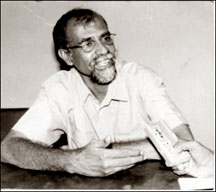India's apolitical judiciary - a national pride
by Afreeha Jawad
No longer can Sri Lanka afford to have the APRC's proposals dangling
like a carrot. Contemporary times believably are the most conducive to
have these proposals concreted in making those dream words 'lasting
solution' a reality. But what have we done at grass roots to educate
people out there on the whole idea of power sharing particularly those
in the urbanized middle class.
|

Professor Jayadeva Uyangoda |
Though India is widely believed to have a federalistic model it was
not so when the Indian constitution was drafted way back in 1951 - the
idea being to uphold a strong central government. India then was not
very different from Sri Lanka. Yet, the difference lay here in that
while India, over the years adjusted into evolving and meeting
constitutional reform that necessitated respective times, we in Sri
Lanka have remained stagnant within our rigid narrow and parochial
enclaves most unwilling to shift one inch from the strong centre that
was despite the changes that have come up over the years compelling us
to make structural transformation to meet ever changing needs. However,
the irony lies in the fact that a whole majority accept change as an
inevitable fact - well in unison with their chosen long standing
religious ideology - the cart's wheel being symbolic of that ideology.
India was luckier in not having a perverted mindset that hurdled
changes which in itself comprises a unique Indian psyche. Is it because
India was Buddhism's birth land while Sri Lanka, its adopted state? - a
poser in lighter vein.
Talking of evolution as part of the empirical state and the need to
meet its demands renouncing political pig headedness is part of prudent
governance. Apart from India, we also see how French Quebee and Swiss
cantons came to be as the central governments there adjusted well into
meeting minority aspirations. Fighting a war is no solution to political
bungling which over the years led to ethnic polarization.
When the Indian model with its unreservedly overpowering centre
thought of excessive control of state governments as the best way out to
govern India, it was the Indian Supreme Court that turned tables on this
political excess and disallowed such control on the states. The begotten
executive and legislature was cut down to sire by the Indian judiciary
when it came down heavily in controlling such political arrogance which
it could afford to do arising out of its apolitical state. India could
stand atop roof and crow over its judiciary's independence. Enjoying
judicial vibrancy has been to India's gain viewed against the backdrops
of its firmness in keeping the idea of checks and balances in place. Let
alone the guilt of moral dislodge, the Indian political leaders may have
feared the consequences of a 'tampered with' judiciary which was why its
independence was much sought after.
One of the features of power sharing in India according to Colombo
university's Political Scientist Professor Jayadeva Uyangoda is that
state governments are into greater autonomy. The judiciary is committed
to protect these states' autonomy.
Significantly, he views Indian federalism to be asymmetrical where
some states have greater or lesser power than others. For instance
Jammu, Kashmir and Punjab have got more powers than other states due to
separatist tendencies.
Thirdly the non-contiguous units in the Indian model reveal the
effective functioning of power sharing. For example the union territory
of Pondicherry has one part of its existence in Andra and another in
Kerala. These territories were under French colonial rule. Pondicherry
thus is not a unified territory.
In power sharing, one important principle is of majority trust in
minorities. "In India this trust is there and the majority are not
afraid to give minority units and more units as and when occasion
demands", he informed and hastened to add that in Sri Lanka some
politicians, bureaucrats and intellectuals do not trust minorities - the
end result being a perennial unwillingness to share power as evidenced
in the concurrent list. The Indian notion of democracy considers
minority rights protection as central to the progress of the nation
state. In contrast in Sri Lanka, the protection of minority rights is
seen as a barrier to the unity of the nation state", he said.
Professor Uyangoda also recalled the attempts in the 1990s to remove
the concurrent list - one of its chief architects being Professor G. L.
Peiris. He even considered the concurrent list to be instrumental in
withdrawing from the left hand what the right hand giveth. As a result
the 1995 devolution proposals saw no provision for it.
However, the current political debate has gone back from 1995 and
even 1987. He views the present efforts into power sharing within a
smaller unit at district level as merely an administrative
decentralization because it will have only a lesser framework of power.
Accordingly, the realization of the need to share power is a must.
Secondly, entertaining the fear of cessation following province based
power sharing holds no good in national interest. Thirdly, it would be
knaive to believe national development to be led by the central
government.
In arriving at these objectives, most important is the judiciary's
independence for on such a judiciary rests the vibrant functioning of a
country's democracy.
[email protected]
|
